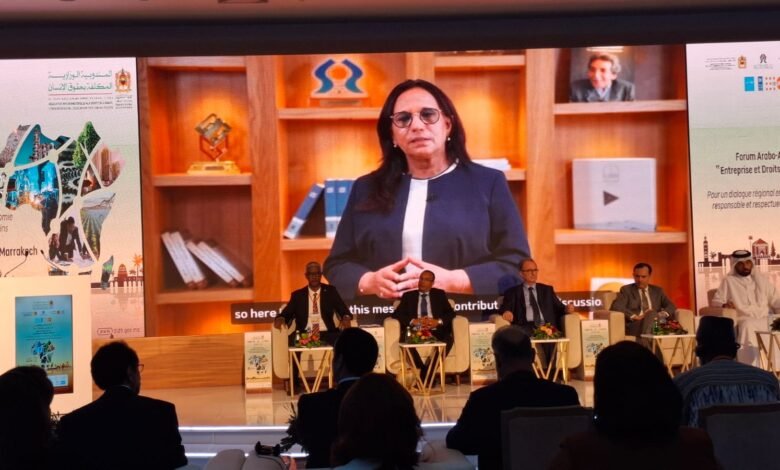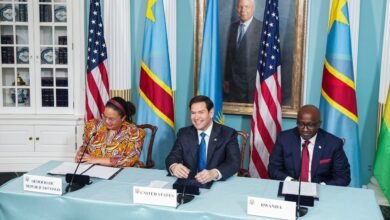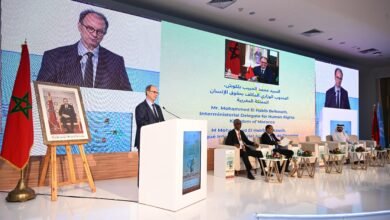Human Rights Must Guide Business Practice, Says CNDH President at Arab-African Forum

Amina Bouayach, President of Morocco’s National Human Rights Council (CNDH), delivered a forceful message at the Arab-African Forum on Business and Human Rights in Marrakech, calling on governments and corporations to place human dignity and rights at the heart of economic decision-making. Speaking during the opening session of the two-day forum, she asserted that sustainable development cannot exist without respect for fundamental rights, nor can investment be truly enduring if it disregards the dignity of people.
“There can be no development without dignity, and no sustainable investment without respect for human rights,” she declared. “These are not optional principles—they are the foundation of real and lasting prosperity.”
Bouayach argued that the link between business and human rights has moved beyond institutional or academic debate to become a strategic pillar for justice, social stability, and human security. She positioned the forum as an opportunity to engage in collective reflection on how to reconcile the United Nations’ Sustainable Development Goals with the African Union’s Agenda 2063. This alignment, she said, must be rooted in rights-based governance and local realities.
The CNDH president also marked the occasion by recalling that this year commemorates the 14th anniversary of the adoption of the UN Guiding Principles on Business and Human Rights, as well as the enduring relevance of the UN Global Compact’s ten principles, which encompass human rights, labor rights, environmental standards, and anti-corruption norms.
However, Bouayach cautioned that the continent’s current trajectory is marked by alarming indicators. Environmental degradation is accelerating, forced displacement is rising, and social inequalities are widening. Vulnerable populations are increasingly exposed to these overlapping crises. She pointed in particular to the continued existence of child labor in Africa, where 72 million children remain engaged in exploitative work—evidence of persistent violations of economic and social rights.
Turning to Morocco’s domestic context, Bouayach acknowledged the country’s strong economic momentum but insisted that growth alone is not enough. She called for a clear and urgent adaptation of Moroccan labor laws and investment regulations to meet international standards for decent work. Large infrastructure projects, she said, must integrate human rights considerations at every stage, from planning to implementation, to ensure they create inclusive and dignified environments free of discrimination and in line with environmental and social norms.
Outlining the strategic direction of the CNDH, she explained that the Council is actively supporting mechanisms—both voluntary and regulatory—that ensure businesses uphold human rights obligations. It is also addressing public complaints related to the environmental and social impact of business activities and contributing to Morocco’s World Cup 2030 candidacy by embedding a human rights-based approach into all planning processes. Furthermore, the Council is advancing a national strategy that integrates business practices with rights protections and promoting the same approach within the African Continental Free Trade Area.
Bouayach also highlighted CNDH’s broader efforts, including the submission of policy observations to United Nations committees, the organization of training workshops that are balanced both regionally and in terms of gender, and the preparation of two national reports examining the implications of artificial intelligence on human rights in the business sector. She underscored the importance of working alongside Parliament and civil society to create a national roadmap for corporate accountability and inclusive development.
She acknowledged the challenges of implementing human rights due diligence, noting that effective progress in this area requires robust national and regional mechanisms and deeper engagement from civil society and national human rights institutions. Participation from the most affected communities, she emphasized, is essential in shaping fair economic policies.
Bouayach concluded with a broader vision for the Arab and African regions, describing them as rich in both natural resources and human potential. This potential, she argued, must be unlocked through development models rooted in local contexts, centered on rights, and designed to empower small and medium-sized enterprises. Communities themselves must be involved in evaluating the impact of investment and development projects.
“The issue is not only economic,” she said. “It is also social, cultural, environmental, human, and ethical. Human rights are not simply tools for development. They are its very core—and the true wealth of any society.”





